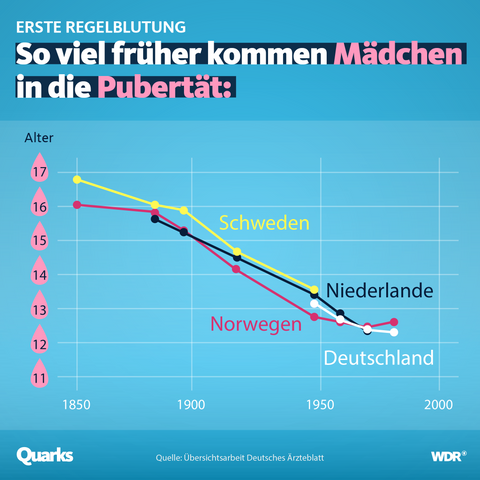First period
The first period marks an important milestone in the lives of young women*. You start to feel like an adult, and your body continues to change. Do you remember when and how you first got your period? How did you feel, and how comfortable were you talking about it?
On average, girls get their first period at the age of 12-13. The onset of menstruation, known as menarche, can occur as early as 7 years old, but this only affects about 1% of menstruating individuals. The average age has been decreasing over the years, and adolescents are experiencing their first menstruation at an earlier stage of their lives.

I'm bleeding! What now?
We've heard so many stories from young menstruators who got their period for the first time. Whether it happened at the airport, on the way to a summer vacation, or right in the middle of school - how uncomfortable! Most of the time, you feel uneasy and hesitant to talk about menstruation. Don't be afraid of leaking or people talking about you and your period. By discussing it with friends and family, you can learn to accept your period. It's important not to hesitate to ask questions. We've all been uncertain and uninformed, and many of us would be happy to share our experiences with you.
Periods are still taboo in 2023, and many people feel ashamed or reluctant to openly talk about them.
Who can I talk to about it?
You're in the midst of puberty, your breasts are growing and often feel sore before your period. You're also experiencing the growth of your first pubic hair, having whitish discharge, and encountering mood swings. The changes in your body are becoming more noticeable. Keeping a menstrual calendar can be helpful in understanding the progression of your menstrual cycle. It allows you to track symptoms such as mood swings, discharge, or heavy bleeding during menstruation more effectively.
You'll probably feel most comfortable talking to your mom or older sister, but aunts and close friends can also be good confidants. The important thing is that you feel at ease during the conversation and don't hesitate. Menstruating is normal, and you don't need to feel embarrassed about it. If you don't feel comfortable speaking directly to someone, you can find informative videos about the first period on platforms like YouTube.
Which period product is best for you?
You're unsure how to deal with your first period and feeling overwhelmed by the multitude of period products available on the market. Did you know how many different period products there are nowadays? The selection is vast and understandably overwhelming! From traditional pads, panty liners, and tampons to menstrual cups, reusable cloth pads, and period underwear.
Especially at a young age, many prefer products that don't need to be inserted into the vagina. Therefore, pads and now period underwear are excellent alternatives. You'll likely feel most comfortable with them, and it won't even be noticeable that you're using a period product.
femtis period underwear is a great choice for your first period because you only need to wear a period panty instead of your regular underwear. The four- to five-layered system perfectly absorbs your blood, and you won't feel wet. Make your period as comfortable as possible. Additionally, hardly anyone will notice that you're menstruating, so you can freely decide whether you want to talk about it or not.
Especially for the first period, classic cotton styles like the Period Hipster Lene are a comfortable choice and provide ultimate comfort on heavy period days. The absorbent layer extends to the waistband at the back, ensuring full protection even when sitting for long periods or at night. Discover our Teen Panties.
What happens in my body?
What exactly happens during your first period, and how does the menstrual cycle of a menstruating person work? The menstrual cycle can be divided into four different phases: menstruation, follicular phase, ovulation phase, and luteal phase. Each phase involves various processes in your uterus. The most noticeable phase is menstruation itself. The duration and intensity of menstruation vary among menstruators. Your uterine lining sheds because there was no fertilized egg. Have you ever noticed small pieces in your menstrual blood? Yes, that's the uterine lining, and it's completely normal. If you experience very heavy bleeding and are unsure, it's always a good idea to visit a gynecologist. Consider going to your first appointment with someone for support, so you don't feel alone.
If you want to learn more details about various topics such as the menstrual cycle, relieving menstrual pain, and tips for heavy menstrual bleeding, our blog contains more articles on these topics.
And why menstruation is something good:
Menstruation is a natural cycle and ultimately signals that everything is fine with your body. Your body is doing well. If you no longer get your period or the intervals between your periods are very irregular, it can be a sign of a potential health issue. Therefore, we should appreciate and accept menstruation as something positive!
Sources:
























